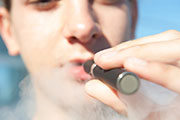December 13, 2014


Latest Healthy Kids News
THURSDAY, Dec. 11, 2014 (HealthDay News) — More than 16 million children in the United States can buy electronic cigarettes legally, even though the devices are not safe for them, a new government report says.
The report from the U.S. Centers for Disease Control and Prevention (CDC) also found that hundreds of millions of Americans are not protected from indoor exposure to secondhand e-cigarette aerosol.
This “aerosol is not harmless water vapor; it can contain nicotine and other toxins,” Brian King, senior scientific advisor in the CDC’s Office on Smoking and Health, said in an agency news release.
Forty states forbid the sale of e-cigarettes to minors, but 10 states and the District of Columbia do permit such sales. That means that more than 16 million youngsters 17 and younger can legally purchase the devices in those states, the researchers determined.
The latest data show that 4.5 percent of all high school students and 1.1 percent of all middle school students in the United States had used e-cigarettes within the past 30 days, according to the report.
“We know e-cigarettes are not safe for youth,” Dr. Tim McAfee, director of the CDC’s Office on Smoking and Health, said in the news release.
While e-cigarettes and other electronic nicotine delivery systems (ENDS) “may have the potential to benefit established adult smokers if used as a complete substitute for all smoked tobacco products, ENDS should not be used by youth and adult non-tobacco users because of the harmful effects of nicotine and other risk exposures, as well as the risk for progression to other forms of tobacco use,” McAfee said.
Secondhand emissions from e-cigarettes are another issue. Twenty-six states and the District of Columbia ban smoking in restaurants, workplaces and bars, but only three of those states — New Jersey, North Dakota and Utah — also prohibit indoor use of e-cigarettes, the report said.
That means that more than 300 million Americans, including 70 million children, are exposed to either secondhand smoke from cigarettes or aerosol from e-cigarettes, according to the study in the Dec. 11 issue of Morbidity and Mortality Weekly Report, published by the CDC.
“Exposure to nicotine can harm adolescent brain development and can be toxic to fetuses. The standard for protecting the health of children and bystanders should be clean air, free of toxic secondhand smoke as well as ENDS aerosol,” King said.
E-cigarettes are marketed as a way to help people stop smoking, but there is no proof they actually improve smokers’ chances of long-term quitting, the CDC said. Proven methods including counseling and medications.
— Robert Preidt
 Copyright © 2014 HealthDay. All rights reserved.
Copyright © 2014 HealthDay. All rights reserved.
SOURCE: U.S. Centers for Disease Control and Prevention, news release, Dec. 11, 2014
![]()